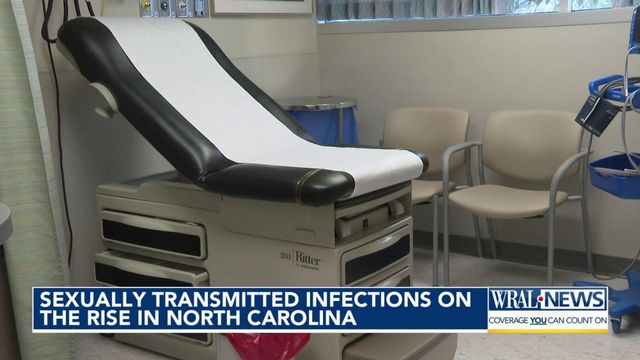HIV, syphilis, chlamydia all on the rise in North Carolina
New data shows more North Carolinians are engaging in sexually risky behaviors.
Posted — UpdatedNew data shows more North Carolinians are engaging in sexually risky behaviors.
According to the latest America’s Health Rankings (AHR) report, North Carolina’s worst health score was for sexual behaviors.
The lowest score was for high-risk HIV behaviors. The state was ranked 48th with a 7.3% for percentage of adults engaging in risky behaviors. The national average was 5.7%.
WakeMed Raleigh OB/GYN Dr. Jenna Beckham said she wasn’t surprised to learn of the new data.
“North Carolina unfortunately has a history of having pretty high rates of not only HIV but other sexually-transmitted infections. This newest data isn’t all that new in terms of the trends that we have seen in our statewide data and also in patients that I care for,” Beckham said.
While other states saw rates steadily go down throughout the pandemic, Beckham explained North Carolina “didn’t see as much of a decline.”
“We’ve definitely seen continued increases in a lot of our sexually-transmitted infections in North Carolina. Some have gone down very slightly over the most recent years, but overall we’re not really moving in a downward direction. Some things, like chlamydia, our rates of increase continue to outpace the rates of increase from nationwide data,” Beckham explained.
Beckham said a lot of her patients identify as LGBTQ+. HIV does tend to have higher rates among the LGBTQ+ community.
“Others like gonorrhea, chlamydia, syphilis, don’t seem to as significantly adversely impact that patient population,” Bekham said.
The OB/GYN said the incident rates are especially rising among younger patients.
The latest AHR report showed HPV vaccinations in teens in North Carolina was also lower than the national average.
Across the state, 55% of adolescents ages 13 to 17 were fully vaccinated for HPV. Nationwide the average is closer to 63%.
Beckham said one of the largest contributing factors to the rise in sexually-transmitted diseases are stigmas and a lack of sexual education. She said conversations need to be encouraged both at home and at school.
“A lot of this sort of education starts in our schools where kids are at the age when they're starting to explore sexually and learning sexual safety, and what are sexual at-risk behaviors,” she said. “A lot of school systems don't even do sexual education. And when they do, it's very, very limited.”
Beckham continued, “There's certain cultural societal things, and sometimes in the South there can be more associations with some conservative beliefs and some stricter religious policies. And so some families aren't also discussing it.”
The doctor explained this then often leads to younger generations not practicing safe sex during their first sexual experiences.
Beckham also said sexual education in rural communities needs to be more of a focus as healthcare access there is lower than in more urban areas.
Beckham encourages people of all ages to be more mindful of their sexual behaviors, especially ahead of Valentine's Day. She said keeping up with regular screenings, having open conversations with your sexual partners and practicing safe sex can all reduce your risk of contracting a sexually transmitted infection.
“Sometimes gonorrhea and chlamydia can even be asymptomatic," Beckham warned. "So, if patients don't know what to look out for and aren't seeing a health care provider regularly and having recommended screenings, they may go undiagnosed and therefore continue to spread it and get other sexual partners infected."
Related Topics
• Credits
Copyright 2024 by Capitol Broadcasting Company. All rights reserved. This material may not be published, broadcast, rewritten or redistributed.





